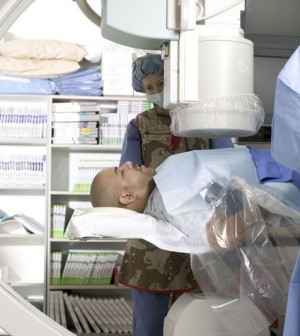- 7 Best Breads for Maintaining Stable Blood Sugar
- Gelatin vs. Collagen: Which is Best for Skin, Nails, and Joints?
- The Long-Term Effects of Daily Turmeric Supplements on Liver Health
- Could Your Grocery Store Meat Be Causing Recurring UTIs?
- Are You Making This Expensive Thermostat Error This Winter?
- Recognizing the Signs of Hypothyroidism
- 10 Strategies to Overcome Insomnia
- Could Artificial Sweeteners Be Aging the Brain Faster?
- Techniques for Soothing Your Nervous System
- Does the Water in Your House Smell Funny? Here’s Why
Scientists Suggest New Way to Predict Lung Cancer Risk


Scientists may some day predict lung cancer risk by examining the telomeres that protect your DNA.
People with long telomeres are at increased risk for lung cancer but not other types of cancer, the researchers found.
Telomeres are protective caps of DNA that prevent damage to the ends of chromosomes. Telomere length naturally shortens with cell division.
“Our work provides compelling evidence of a relationship between long telomeres and increased risk for lung adenocarcinoma,” said lead author Brandon Pierce, an assistant professor of public health sciences at the University of Chicago.
“The prevailing hypothesis has been that short telomeres are bad for health, but it appears that this does not necessarily translate to some types of cancer,” he added.
Researchers analyzed genetic data from more than 50,000 cancer patients and 60,000 people without cancer to learn more about the links between telomere length and the risk of five types of cancer: breast, lung, colon, ovarian and prostate.
The results found an association between long telomeres and increased risk of lung cancer, but there was no significant association between telomere length and any of the other types of cancer.
The study was published July 29 in the journal Human Molecular Genetics.
Because long telomeres enable more rounds of cell division than short telomeres, cells can live longer and are more likely to develop cancer-causing mutations, the researchers suggested.
“The complex relationship between telomeres and cancer risk is one that we need to further understand,” Pierce said in a news release from the University of Chicago Medical Center. “This study gives us an estimate of a causal relationship that could serve as a guidepost for the development of interventions in the future.”
More information
The U.S. National Cancer Institute talks about preventing lung cancer.
Source: HealthDay
Copyright © 2026 HealthDay. All rights reserved.










